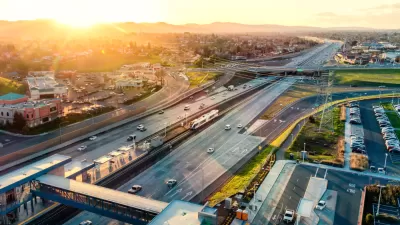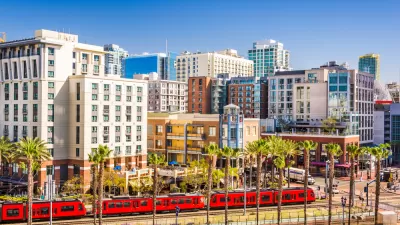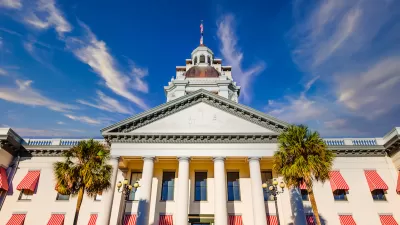The newly released Climate Action Plan for Transportation Infrastructure shifts the state's transportation priorities to focus on clean energy and livability.

The California State Transportation Agency (CalSTA) has released the Climate Action Plan for Transportation Infrastructure (CAPTI), a proposal aimed at guiding "California transportation investments towards sustainable, clean transportation options," reports Melanie Curry in Streetsblog California. The plan, developed in response to executive orders by California Governor Newsom that called for new strategies for reducing greenhouse gas emissions, identifies "near term actions, and investment strategies, to improve clean transportation, sustainable freight, and transit options" while also maintaining a focus on fixing aging infrastructure.
Although CAPTI doesn't "doesn’t change any of the existing transportation funding programs or structures," it provides "guiding principles for funding decisions" that seek to shift emphasis to more sustainable modes. The plan recommends "investments should take climate risk into account, help reduce fatalities, promote projects that do not increase vehicle travel, support infill development, and protect natural and working lands."
Despite its narrow scope (CAPTI's guidelines only apply to "discretionary" funding), Curry writes that CAPTI is a major step toward reimagining how California prioritizes transportation projects. "Until now, the state has made decisions about how to invest its considerable transportation dollars wholly based on a vague policy framework that encourages spending on big, new capital projects," but the new plan creates a stronger mandate for considering the health, livability, and housing impacts of transportation policy.
FULL STORY: CA Transportation Agency Releases Plan to Support, Promote Sustainable Transportation

Maui's Vacation Rental Debate Turns Ugly
Verbal attacks, misinformation campaigns and fistfights plague a high-stakes debate to convert thousands of vacation rentals into long-term housing.

Planetizen Federal Action Tracker
A weekly monitor of how Trump’s orders and actions are impacting planners and planning in America.

In Urban Planning, AI Prompting Could be the New Design Thinking
Creativity has long been key to great urban design. What if we see AI as our new creative partner?

How Trump's HUD Budget Proposal Would Harm Homelessness Response
Experts say the change to the HUD budget would make it more difficult to identify people who are homeless and connect them with services, and to prevent homelessness.

The Vast Potential of the Right-of-Way
One writer argues that the space between two building faces is the most important element of the built environment.

Florida Seniors Face Rising Homelessness Risk
High housing costs are pushing more seniors, many of them on a fixed income, into homelessness.
Urban Design for Planners 1: Software Tools
This six-course series explores essential urban design concepts using open source software and equips planners with the tools they need to participate fully in the urban design process.
Planning for Universal Design
Learn the tools for implementing Universal Design in planning regulations.
Gallatin County Department of Planning & Community Development
Heyer Gruel & Associates PA
JM Goldson LLC
Mpact (founded as Rail~Volution)
City of Camden Redevelopment Agency
City of Astoria
Jefferson Parish Government
Camden Redevelopment Agency
City of Claremont





























